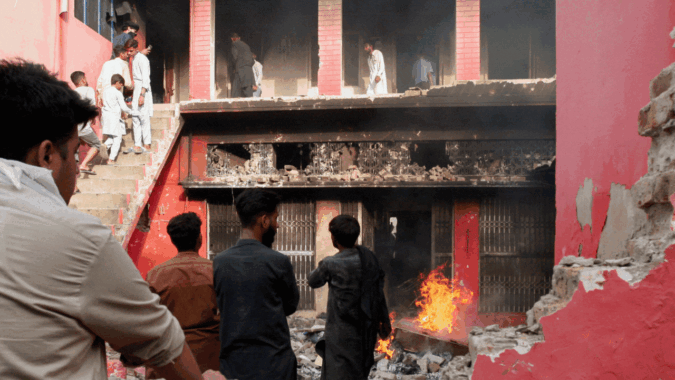The scale of the violence, in which hundreds of Muslim men were seen destroying properties and chanting angry slogans, prompted the government to deploy additional police forces and send in the army to help restore order.
What caused the mob attack
Violence broke out in Faisalabad’s Jaranwala in the Punjab province after some Muslims living in the area claimed they had seen a local Christian, Raja Amir, and his friend tearing out pages from a Quran, throwing them on the ground and writing insulting remarks on other pages.
Police chief Rizwan Khan said the alleged act angered the local Muslims, who attacked multiple churches and several Christian homes, burning furniture and other household items. Some members of the Christian community fled their homes to escape the mob.
“The crowd inflicted heavy damage on the area including to homes of Christians, and many churches,” Ahad Noor, a district government official, told AFP.
Local sources told Dawn that the situation became worse when members of the Tehreek-i-Labbaik Pakistan (TLP) made public announcements from mosques and other places, riling up people to reach the site of the alleged incident.
Videos and photos posted on social media show an angry mob descending upon a church, throwing pieces of bricks and burning it. In another video, two other churches are attacked, their windows broken as attackers throw furniture out and set it on fire.
In one video, crowds cheer and demand punishment for the accused blasphemers as a cross is torn from the top of a church.
‘They burned, desecrated Bibles’
Yasir Bhatti, a 31-year-old Christian, fled his home in a narrow alley next to one of the churches that was ransacked by the mob.
“They broke the windows, doors and took out fridges, sofas, chairs and other household items to pile them up in front of the Church to be burnt. They also burnt and desecrated Bibles, they were ruthless,” he told AFP by phone.
Father Gulshan Barkat, who teaches church history at the National Catholic Institute of Theology in Karachi, described the blasphemy allegations as a “false accusation” and said the local mosques were also to blame because loudspeakers erected on minarets had earlier in the day called on Muslims to gather and “attack the churches and Christian community.”
“The emotion of our Muslim brethren flares up very quickly, even at hearsay,” he said.
A senior Christian leader, Bishop Azad Marshall, appealed for help on social media and said he was “deeply pained and distressed.”
“We cry out for justice and action from law enforcement and those who dispense justice and the safety of all citizens to intervene immediately and assure us that our lives are valuable in our own homeland that has just celebrated independence and freedom,” he posted on X.
Section 144 has been imposed by the local administration, prohibiting all kinds of assembly for at least 7 days.
Several thousand police personnel have been sent to secure the area and dozens of people detained.
Local outlets reported that police had to seek the help of Muslim clerics and elders to quell the violence.
Dozens of rioters have been arrested.
US expresses concerns over mob attack
Wednesday’s attack drew widespread condemnation, including from top Pakistani leaders and even the US State Department.
Caretaker Prime Minister Anwaar-ul-Haq Kakar said he was “gutted” by the images coming out of Faisalabad. “Stern action would be taken against those who violate law and target minorities. All law enforcement has been asked to apprehend culprits & bring them to justice,” he wrote on the social media platform X, formerly known as Twitter.
Former Prime Minister Shehbaz Sharif also condemned the rampage. “There is no place for violence in any religion.”
The US urged Pakistan to investigate the mob attacks against churches as it expressed “deep concern” over violence against the minority community.
US State Department spokesman Vedant Patel told said that while the United States backed free expression, “violence or the threat of violence is never an acceptable form of expression.”
“We urge Pakistani authorities to conduct a full investigation into these allegations and call for calm,” he said.
Blasphemy in Pakistan & attacks on minorities
The anti-Christian violence in Pakistan is the latest unrest in the world’s fifth-most populous country where blasphemy is a highly sensitive issue.
Blasphemy accusations are common in Pakistan.
Under the country’s blasphemy laws, anyone found guilty of insulting Islam or Islamic religious figures can be sentenced to death.
Even the accusation of blasphemy can cause riots and incite mobs to violence, lynching and killings.
Last year, a Sri Lankan factory manager accused of committing blasphemy was tortured to death by a mob of hundreds.
Christians, who make up around 2% of the population, occupy one of the lowest rungs in Pakistani society.
They are frequently targeted with spurious and unfounded blasphemy allegations that can be used to settle personal vendettas.
Islamist right-wing leaders and political parties across Pakistan frequently rally around the issue.
Politicians have been assassinated, European countries threatened with nuclear annihilation and students have been lynched over accusations of blasphemy.
Christian woman Asia Bibi was at the centre of a decade-long blasphemy row in Pakistan, which eventually saw her death sentence overturned and she was later allowed to leave the country.
Her case sparked violent demonstrations and high-profile assassinations while spotlighting religious extremism across wide sections of Pakistani society.
(With inputs from agencies)
